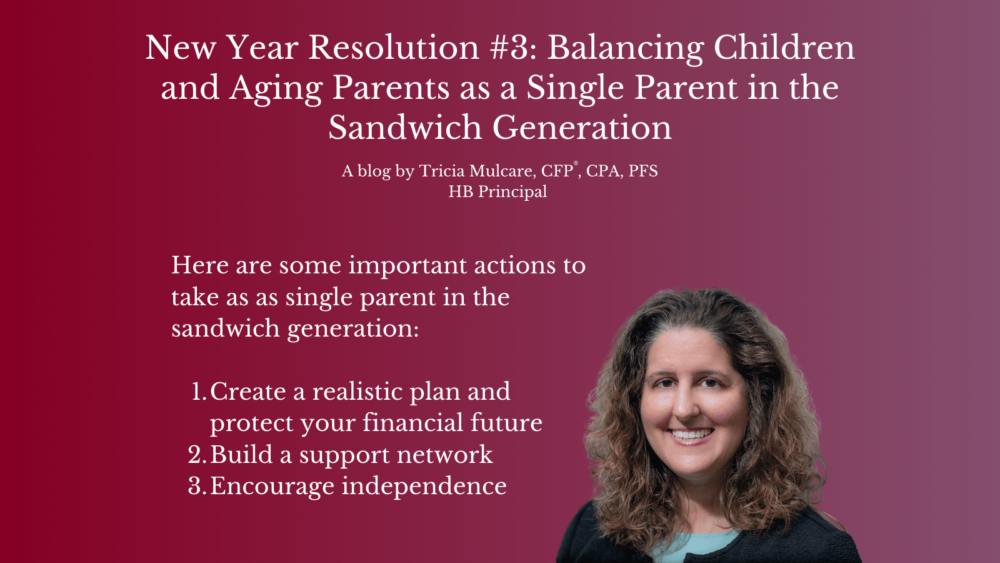Navigating life as a single parent can be a significant challenge on its own, but when combined with the responsibilities of caring for aging parents, it can feel overwhelming. The “sandwich generation”—those simultaneously supporting both their children and their parents—often find themselves stretched thin both financially and emotionally. Here are practical tips to help single parents in this situation manage their roles effectively while maintaining their well-being.
Create a Realistic Plan and Protect Your Financial Future
Start by evaluating your time, finances, and energy. Draft a plan that prioritizes essential tasks for both your children and parents.
- Time Management: Use digital tools like shared calendars to track school events, medical appointments, and caregiving tasks. Burnout is a real risk for sandwich generation caregivers. Build in time for self-care, whether that be a 15-minute walk for fresh air, a yoga class, or even a bubble bath after the children have gone to bed. One client told me that she maintained her sanity by journaling to manage stress. Another told me that weekly conversations with her college roommate, who is now living across the country, provided an opportunity to put her mind in a different place for just a few minutes.
- Financial Planning: Develop a spending plan that includes childcare, eldercare, and emergency funds. During annual reviews with clients, we evaluate the prior year’s spending as we set goals for the upcoming year. It is important to set aside funds for your retirement so that you are not a burden to your children in your later years. Assess your insurance policies and work with your parents to create or update important documents, including wills, powers of attorney, and medical directives.
Build a Support Network
No one should carry these responsibilities alone. Reach out for help and build a support system. You are likely surrounded by friends, neighbors, and co-workers navigating similar struggles and challenges.
- Family and Friends: Delegate tasks such as transportation for children or errands for parents. Sharing the load (whether physically or financially) with siblings can make it a bit less stressful. Develop a policy of open and honest communication to set boundaries and manage expectations. If possible, find ways to include your parents in decisions about their care.
- Community Resources: Explore local programs that offer respite care, meal delivery, or support groups for caregivers. In addition to offering a safe space to discuss challenges you are facing, a local non-profit may offer educational programs around dementia or resources to help you navigate feelings of sadness, etc.
- Professional Help: Research in-home care options and/or the services of a counselor or life coach to help you navigate this uncertain new reality. Skilled care may be covered by Medicare. AARP, Adult Children of Aging Parents, and the Family Caregiver Alliance are a few resources to consult.
Encourage Independence
Fostering independence in both children and parents can alleviate some pressure. It may help to teach age-appropriate tasks to children, like doing the laundry or preparing simple meals. Your aging parents may be able to stay self-sufficient by setting up automated bill payments, organizing their medications, or exploring senior-friendly technologies.
Conclusion
By implementing these strategies, single parents in the sandwich generation will be better equipped to manage their dual caregiving roles. Seeking help and planning ahead are signs of strength and can be empowering. It is equally important to realize that situations can change rapidly, so be ready to change course and adapt. This may require adjusting plans, reorganizing schedules, reallocating resources, and shifting priorities. At the end of each day, remind yourself that balancing these responsibilities is no small feat, but you have the right tools and support, and you can not only survive…YOU CAN THRIVE!
To learn more or get help with your finances, please visit us at homrichberg.com, send an email to info@hbwealth.com, or call 404.264.1400.
Important Disclosures
This article may not be copied, reproduced, or distributed without Homrich Berg’s prior written consent.
All information is as of the date above unless otherwise disclosed. The information is provided for informational purposes only and should not be considered a recommendation to purchase or sell any financial instrument, product, or service sponsored by Homrich Berg or its affiliates or agents. The information does not represent legal, tax, accounting, or investment advice; recipients should consult their respective advisors regarding such matters. This material may not be suitable for all investors. Neither Homrich Berg nor any affiliates make any representation or warranty as to the accuracy or merit of this analysis for individual use. Information contained herein has been obtained from sources believed to be reliable but are not guaranteed. Investors are advised to consult with their investment professional about their specific financial needs and goals before making any investment decision.
©2025 Homrich Berg.













A Deeper Look At The U.S. Labor Market And How It Continues To Support Consumer Spending
Last month, we discussed how recent inflation data could influence the Federal Reserve’s (Fed) decision…
Read More